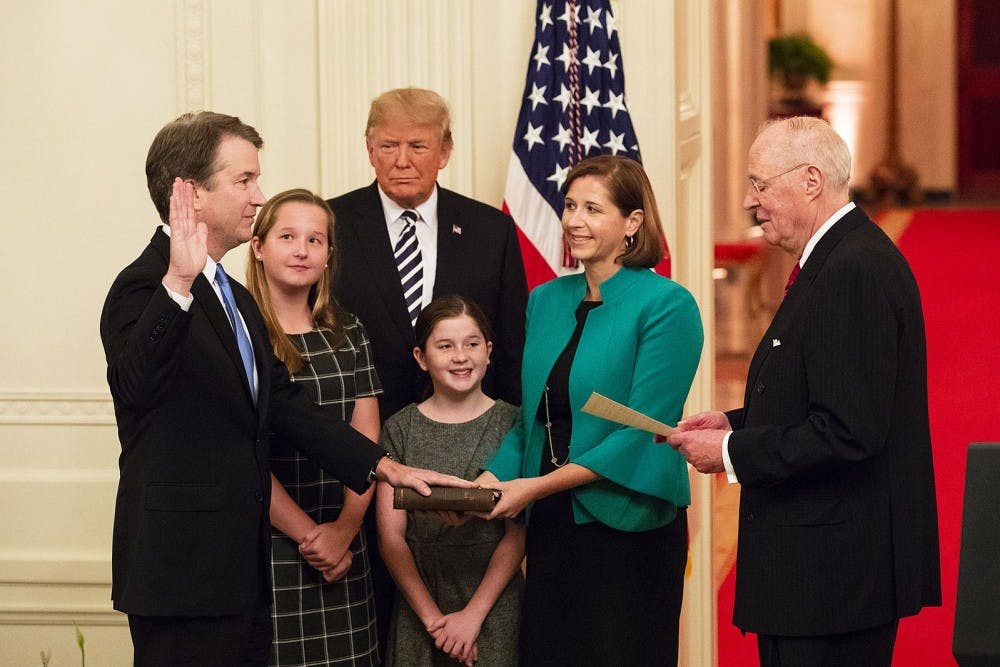During his contentious nomination process to the United States Supreme Court, newly minted Justice Brett Kavanaugh referenced his time at Yale Law School repeatedly in defense of sexual assault accusations.
While students and administrators at his alma mater have denounced his nomination, the university can now boast of having nine law school graduates reach the highest court in the land — second only to Harvard Law School, which has seen 19 graduates serve on the court.
All the current SCOTUS justices hold law degrees from either Harvard or Yale, except one. Justice Ruth Bader Ginsberg holds a degree from Columbia Law School, but she attended Harvard Law before moving to New York and ultimately transferring schools.
Penn Law School has only ever seen one graduate, Owen Josephus Roberts, go on to serve the Supreme Court.
"Since the Supreme Court has existed for over two centuries, any list of 'where justices came from' runs the risk of being an outdated time capsule. Five justices had no law school education at all (they did apprenticeships), and three went to the now-defunct Litchfield Law School in Connecticut," Penn Law Dean Ted Ruger wrote in an emailed statement to The Daily Pennsylvanian.
"In this case, the past is not prologue – and appointments in the coming decades are unlikely to mirror past practices. So, however the Court’s composition may look today, there may yet be a few more Penn Law justices in its future," Ruger continued. "Finally, we favor more diversity on the U.S. Supreme Court, and in the federal judiciary overall, not just limited to law school affiliation."
Case Western Reserve University School of Law professor Jonathan Adler explained that the overrepresentation of Harvard Law and Yale Law alumni among the justices can be attributed to the prestige associated with the degrees from such schools, the tendency of presidents to seek to minimize feedback in the nomination process, and a form of self-selection among students.
RELATED:
Penn Law prof. Amy Wax on Brett Kavanaugh allegations: ‘It’s too late, Ms. Ford’
Harvard Law School declines to say whether Brett Kavanaugh will be allowed to return as lecturer
"If you really know that you want to be a federal clerk and you want the opportunities, that might … make you more likely to try to get into Yale and Harvard," Adler said.
Roberts, born in 1875, grew up in Philadelphia, and graduated from Penn with a bachelor's degree in 1895. As a student, he was a member of the Phi Betta Kappa Society and edited the DP.

He went on to earn his L.L.B. from Penn Law in 1898 and served as a law professor until 1918. He also worked as a partner in a Philadelphia law firm, before serving as assistant district attorney in the city and as an investigator under former President Calvin Coolidge in the Teapot Dome Scandal.
Former President Herbert Hoover nominated Roberts to the Supreme Court in 1930 after a prior selection failed the nomination process in the Senate.
Two other men associated with the University served on the Supreme Court, but neither graduated from Penn Law.
Norm Pattis, a civil rights lawyer and a legal author, wrote in an email to the DP that the high frequency of graduates from a select group of law schools on the Supreme Court is indicative of larger similarities among the justices.
"This is actually a far more significant issue than the question supposes. It’s not just a question of why Harvard and Yale predominate — Columbia is a minor player. It’s really why all the justices appear cut from the same mold," Pattis wrote.
In all, though, he said he believed the overrepresentation of certain educational backgrounds is indicative of the goals of the schools.
"Why Yale and Harvard? They want it. They network. They fight for seats. Penn isn’t up to the game," Pattis wrote.









